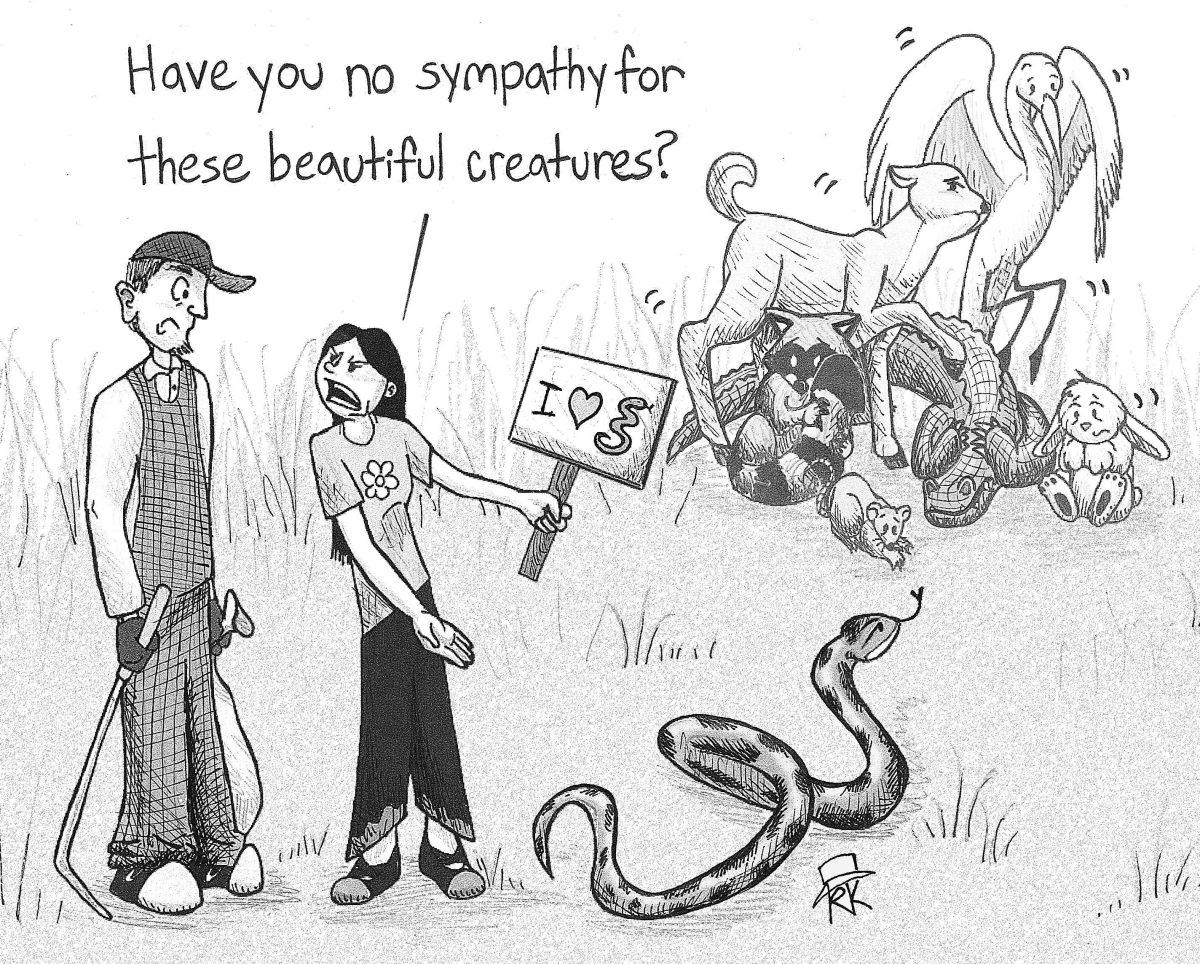Back in my heyday along Lafayette’s Bayou Vermilion, I’d spend my afternoons in search for all sorts of reptiles.
Snakes were always the most dangerous and naturally intriguing to confront. Consequently, there was nothing cooler than whipping my machete over the snake and splitting it in half. Later, I would coil the carcass and place it conveniently in the path of my sister’s morning routine.
Appalling? Maybe leaving it for my sister was, but her reaction proved a dead snake was the only good snake.
PETA, however, may not have been so happy with my prank.
In Florida, a battle has started between the state and the People for the Ethical Treatment of Animals, known in households as PETA.
In an attempt to reduce the population of non-indigenous Burmese pythons, the state has sponsored a hunting contest this January offering cash rewards to the hunter with the most and the lengthiest trophies.
There are a couple of theories as to how the massive serpents have reached the wetlands of south Florida, but regardless, they are not a natural species of the ecosystem. With the lack of a natural predator in the habitat, stable populations of other indigenous critters in the area have become an issue.
The battle between Florida and PETA is purportedly over the humaneness offered to a targeted snake.
Florida has endorsed a number of efficient and effective ways to kill a python that result in the immediate loss of consciousness. The method under scrutiny by PETA is decapitation.
Decapitation in some ancient cultures was an honorable means of death. However, in the serpent’s instance, though quick and painless, it’s shameful.
Akin to dogs and horses, the wild python has coexisted in ways with humans — specifically south Floridians — that have been fruitful enough for them to be owed some decency.
I suppose lethal injection is more of what PETA is requesting.
PETA’s opening statement on its website, “Animals are not ours to eat, wear, experiment on, use for entertainment, or abuse in anyway,” is misinformed.
Humans do not purely act on instinct, while animals do. We contain the capacity to perceive good and bad, making us a higher species.
PETA’ians may see it otherwise. However, I believe this is widely uncontested, placing us at the top of the food chain, and making animals ours to eat. Humans have dined on good ole red meat — a great source for protein and vitamin B— for centuries.
Do you think a neanderthal, when bitten by a winter frost, grabbed a pair of cotton slacks to warm his keister? More likely he fashioned himself with a bearskin coat. Or later on, if a cowboy needed a new pair of boots, he may have skinned a rattler and cobbled a nice pair of snakeskin shit-kickers.
Pinky and the Brain have done much for modern medicine, and just this week some Louisiana lab chimps were given retirement and pension.
My dogs, though gullible, are awfully entertaining.
What’s going on in Florida is far from abuse. Although, I’m sure there are plenty of instances — past, present and future — of indecency to animals that should be prevented.
But snakes, especially where they do not belong, deserve no such decency.
Ironically, by educating competitors of efficient harvesting methods through a required training process and listing rules and regulations, Florida is effectively being humane.
PETA’s initiatives seem to have trouble staying focused on truly viable issues. There is a distinction between animal cruelty and an attempt to control a predatory species disrupting an ecological cycle — PETA has failed to make it.
As of Jan. 21, hunters have only harvested 27 pythons. I am unaware as to what the state is considering as par, but I’d guess this is not up to it.
Nevertheless, a life is a priceless treasure, and we should remember those who have fallen further than the dirt beneath their slick bellies.





